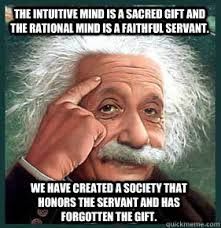Intuition
Should You Trust Your Intuition?
It can be powerful but not always accurate.
Posted March 31, 2018
It’s a common phrase we have all used: “I trust my intuition” as we settle on a decision, or an action. We “feel it in our gut” and feel reassured, as we source this decision from somewhere inside ourselves. This feeling that we look for usually indicates to ourselves that we are making the correct choice and in fact, can occur instantaneously. On the other hand, when we feel uncomfortable or ill at ease, we might say, “this doesn’t feel right” and use this to shy away from a decision or action.
But is this a wise idea for making decisions or taking actions? One definition of intuition is a “direct perception of truth, fact, independent of any reasoning process.” While I believe there is much validity to trusting your intuition, and can be a powerful ally,

there are some caveats that may lead us astray.
The consequences of unfinished emotional business
Unfinished emotional business signifies feelings that sit inside us from experiences of the past. The past could be yesterday or it could be from our childhood. Feelings don’t dissipate or resolve on their own. They need to be acknowledged and “digested” in order for us to truly let go of them. For many, emotions are uncomfortable and thus there is a tendency to ignore or somehow avoid noticing or dealing with them. Certainly, powerful emotions triggered during childhood would be overwhelming if we didn’t have some defensive way of pushing them down or otherwise distracting ourselves from them. As adults our discomfort with emotions may lead to “sweeping them under the rug.”
When we ignore or otherwise push down these feelings they become an unconscious (or sometimes conscious) source of distraction as a part of us is always trying to finish what’s unfinished – i.e., the awareness and expression of the emotion. The unconscious drive for their completion can quietly direct much of our behavior and otherwise trigger unexpected reactions. In fact, as a therapist I’m frequently dealing with clients who have made bad choices of partners as they unconsciously try to deal with the emotional residue of childhood by choosing inappropriate relationships. If we take a closer look at this process it’s easy to see how we can mistake this drive for completion as an accurate intuitive awareness.
Neuroception
Stephen Porges explains neuroception as the continuous subconscious assessment by the autonomic nervous system of the safety or danger of any given moment. A neuroception of danger will occur before there is conscious awareness, and will trigger defensive behaviors even when there is an absence of any rational decision of threat. This neuroceptive process can accurately detect danger, but much of the time it responds to stimuli in the environment that have some association with a real threat or danger from the past. In other words, when there is a neuroception signal of threat, regardless of any rational cause, our psyches and bodies will respond and there will be a defensive reaction, a sense of danger and an experience of anxiety or fear, when there isn’t a real danger. Here is another set of circumstances in which our intuition can be inappropriately saying, “there is danger, put your defenses up or get out of here.”
Wounding and conditioning influence our intuitive process. Another example is how we are attracted to the familiar while we can become uncomfortable when we approach new behaviors. For the most part we like to stay within our safe boundaries; those activities or behaviors that we know that we can handle. Growth and the engagement of new challenges can be awkward. Here again it’s important to realize this can be one of our signals to stay away. This might be inappropriate and interfere with new learning and development.
Intuition is a powerful aid in our discernment and decision making. In fact there is research that demonstrates the power and accuracy of this process1; and that it comes before the more analytic process. When you are also aware of your unfinished business that can influence intuition, and recognize that we tend to be influenced by what’s familiar, and shy away from what’s uncomfortable you will be better served by your intuition.
References
Bechara, A., Damasio, H., Tranel, D., Damasio, A.R., (1997) Deciding advantageously before knowing the advantageous strategy. Science. 275(5304): 1293-5.


